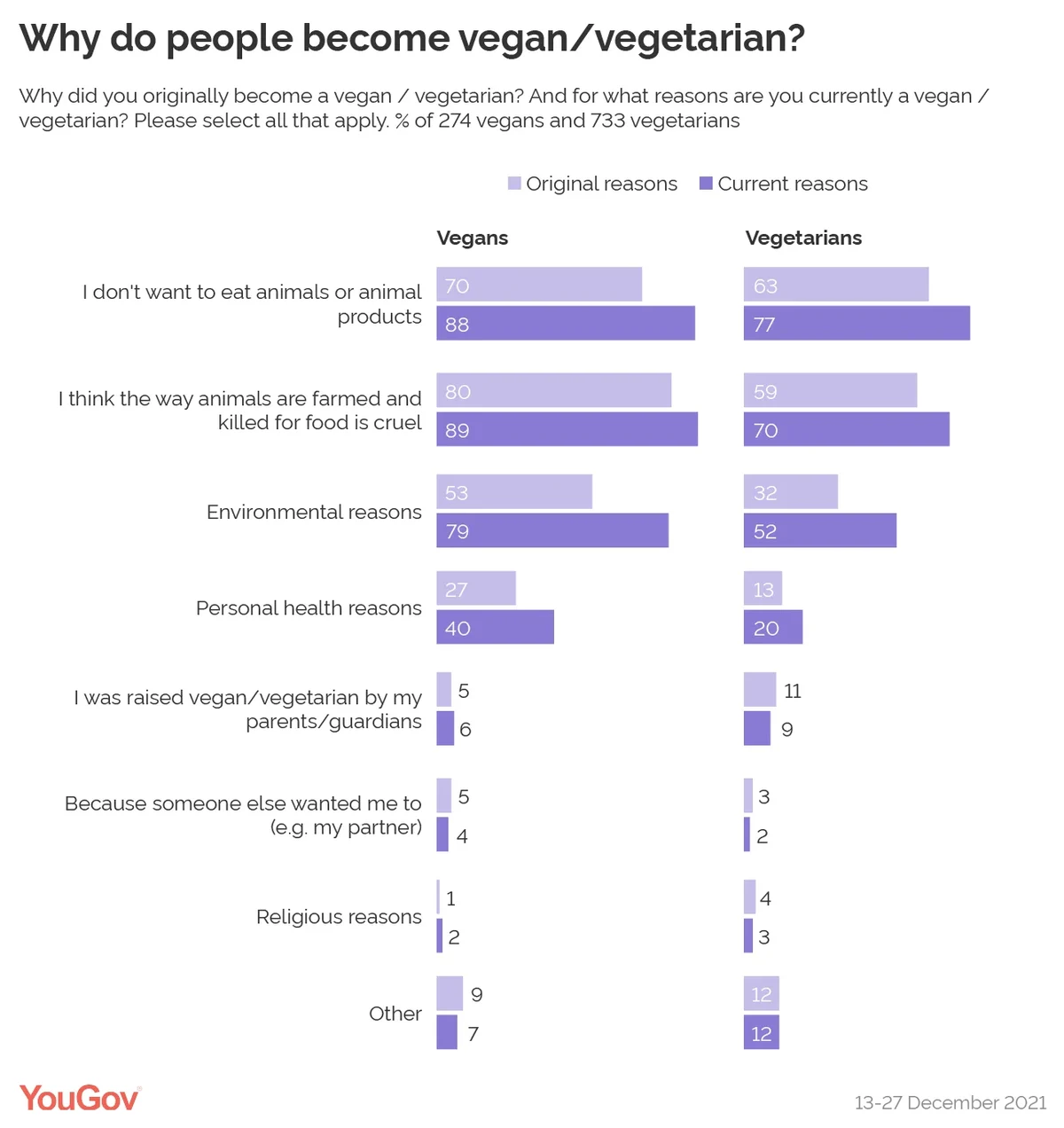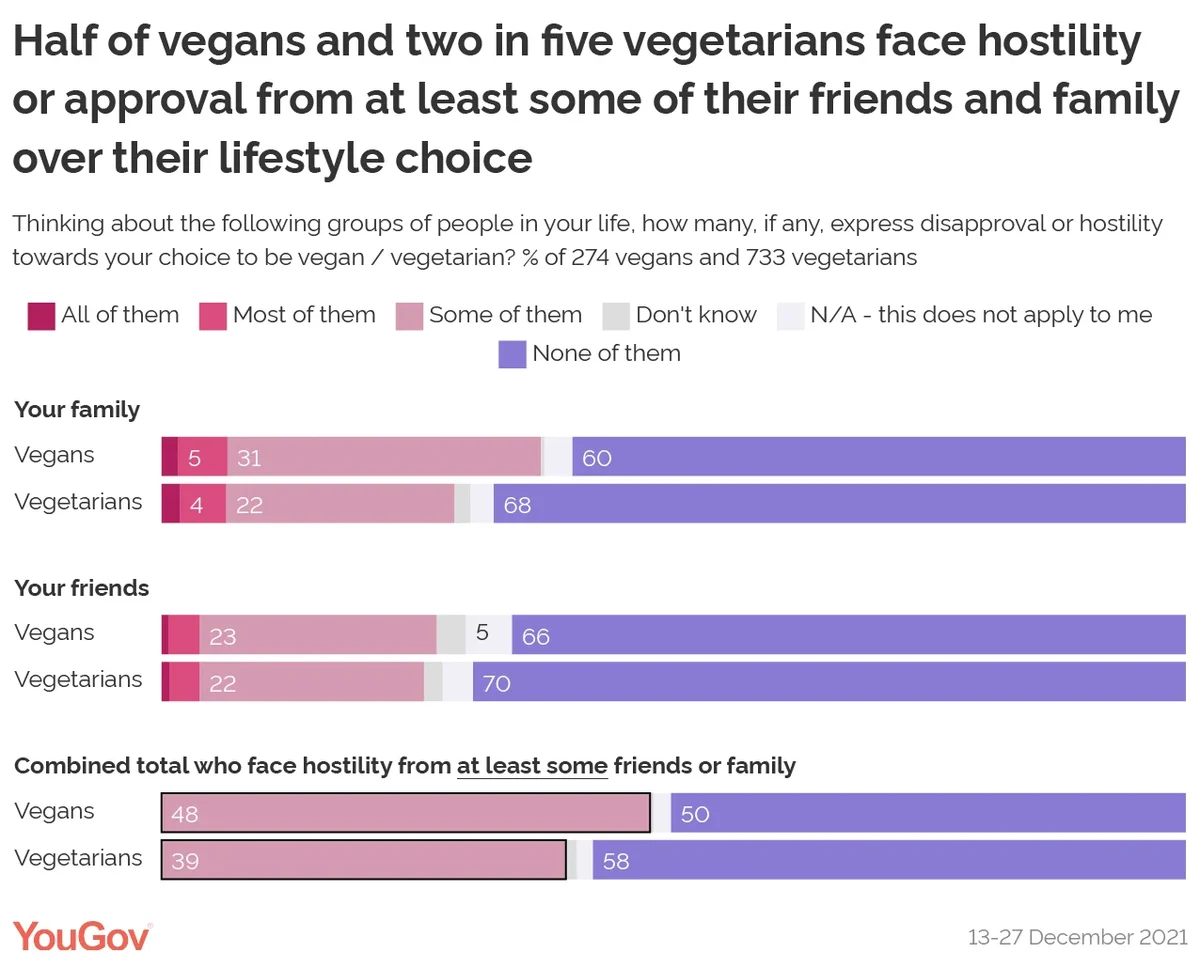YouGov talks to 1,000 Britons who have given up eating meat
The first month of the year sees many people embark on a ‘Veganuary’ adventure, trying to follow a plant-based diet for the duration of January. Those seeking to eat without meat are becoming increasingly well catered for, with food delivery service Deliveroo showing that around 15,000 restaurants across the UK added plant-based dishes to their standard menus in 2021.
Now a new YouGov survey of 1,000 vegans and vegetarians provides unique insights to these groups, asking, among other things, what motivated them to start, how they practice their beliefs, and what their experience has been like.
How many vegans and vegetarians are there in Britain?
Britain’s vegan and vegetarian population remains small. YouGov tracker data over the last two and a half years puts the size of the vegan population at about 2-3% and the vegetarian population at about 5-7%.
Our dedicated survey of vegans and vegetarians shows that most of Britain’s vegans are pretty new to the lifestyle, with 63% having started out only in the last five years. That being said, the overwhelming majority of Britain’s vegans (81%) graduated from vegetarianism, so many have been avoiding meat for much longer than this.
There are plenty of newbie vegetarians as well, with 46% having cut all meat out of their diet in the last five years.
Why do people become vegan or vegetarian?
Unsurprisingly, the top reasons people originally became vegetarian or vegan are not wanting to eat animals or animal products (63% of vegetarians and 70% of vegans) and believing that the way animals are raised and killed for food is cruel (59% and 80% respectively).
These motivations are even higher when asked their reasons for remaining vegan or vegetarian, suggesting that some people get into the diet or lifestyle for some reasons and then, as they learn more, incorporate extra motivations into their personal philosophy as well.

With many environmental organisations calling for a shift to more plant-based eating, half of vegans (53%) and a third of vegetarians (32%) say their concerns for Mother Earth were a prompt for originally going vegan. The environmental factor sees the largest increase between how many set out originally because of environmental concerns and how many say it’s become a motivation for continuing to do so (79% of vegans and 52% of vegetarians).
Health was also cited as a key reason by a quarter of vegans (27%) and one in eight vegetarians (13%) starting out on a meat-free diet for this reason. The same survey shows that seven in ten vegans and a third of vegetarians say their health has improved as a result of their diet, which could be part of the reason the number of people saying health is a current reason they practice veganism or vegetarianism has increased to 40% and 20% respectively.
What else do people practice as part of their vegetarian or vegan lifestyle?
While the dietary aspects are the most obvious part of the vegetarian and vegan lifestyle, for many it extends beyond just what they put on their plate.
Some nine in ten vegans (92%) say they avoid beauty and hygiene products that may have been tested on animals, as do 79% of vegetarians.
When it comes to clothing, 70% of vegetarians and 74% of vegans avoid purchasing new products with real animal fur, with similar numbers (67% and 71%) refusing to buy second hand fur products also.
There is a much more noticeable split between groups when it comes to leather. While 68% of vegans won’t buy new leather items, putting it on a par with animal fur, this figure falls to just 51% of vegetarians. Likewise, when it comes to second hand leather, vegans (57%) are substantially more likely to boycott it than vegetarians (39%).
Vegans are also far more likely to evangelize about the benefits of the lifestyle than vegetarians: 61% of vegans say they encourage friends and family to make lifestyle changes, compared to 37% of vegetarians.
Is it ok for vegans and vegetarians to eat lab-grown meat?
Recent years have seen a surge of investment in attempts to get lab-grown meat out to market, with supporters arguing that it will produce meat without the need to farm and slaughter an animal and with far less of an environmental impact.
Vegetarians and vegans aren’t certain on whether it would be acceptable for them to eat lab grown meat, with 42% of vegetarians and 35% of vegans saying it would be unacceptable. Still, 34% of vegetarians and 30% of vegans think it would be ok for someone with their respective diets to eat meat grown from embryos. Around 24-29% are still unsure on the morality of the question, however.
Is it ok for vegans and vegetarians to eat insects?
For many people who are concerned about the sustainability of their food, insects have been cited as a more environmentally friendly way to get protein and other essential vitamins than eating meat. However, 82% of vegans and 83% of vegetarians think it’d be unacceptable for them to eat insects. Only 9% of vegetarians, and 5% of vegans, think it would be ok to incorporate them into their diets.
Is it ok for vegans and vegetarians to wild animals that died of natural causes?
Because so many vegans and vegetarians stopped eating meat because of the kind of conditions farmed animals are put through, is it philosophically acceptable to eat animals that weren’t raised or killed specifically to be food?
Seemingly not, with the vast majority of vegans and vegetarians (77-82%) saying it would be unacceptable to eat wild animals that had died of natural causes.
Is it ok for vegans and vegetarians to wear leather?
Seven in ten vegans (70%) and a majority of vegetarians (56%) say wearing newly-made leather products is unacceptable. Nevertheless, a third of vegetarians think such garments are acceptable for vegetarians (33%). A mere 1% of vegans say they should be able to wear new leather (although 21% see nothing wrong with vegetarians being able to do so.
Attitudes are more lenient when it comes to second hand leather clothing, which 50% of vegetarians and 31% of vegans say would be ok for their own groups to wear. Only a third from each group (33-34%) think it is unacceptable to wear second hand leather.
Is it ok for vegans to eat honey?
A key tenet of vegan belief that separates it from vegetarianism is that not only should people not eat animals but they should also not benefit from animal labour.
Perhaps the most well-known example of this is that vegans aren’t supposed to eat honey, something which two thirds of vegans we asked (67%) say is unacceptable. Half (52%) also say it is wrong for vegans to ride horses or to use vehicles pulled by horses, compared to 22% who think this is ok.
Are imitation meat and dairy products as good as the real thing?
Recent years have seen a proliferation of new meat-free and dairy-free imitation products, aimed not just at vegans and vegetarians but also at those with specific intolerances.
While companies are working hard at making these products as realistic as possible, there is still some way to go. Of the types of imitation food we asked about, vegan substitute chicken comes closes to matching the real thing, although just 10% of vegans and vegetarians proclaim it “basically identical”. A majority (55%) do say it is at least “fairly close”, however.
Dairy products seem to have been harder to nail down, particularly cheese. Fully 45% describe the current market of fake cheeses to be “not very close” or “not close at all” to the real deal, outnumbering the 35% who see them as at least fairly close.
Replacements for cow’s milk also score relatively poorly, with 32% saying they aren’t much like the real thing.
How many vegans and vegetarians face hostility from friends and family?
The results show that half of vegans (48%) and four in ten vegetarians (39%) face disapproval or hostility from at least some of their family or friends about their lifestyle choice.
Vegans are more likely to say they face negativity from family members (37%) than friends (27%), while among vegetarians these figures are about the same (29% and 26%).













